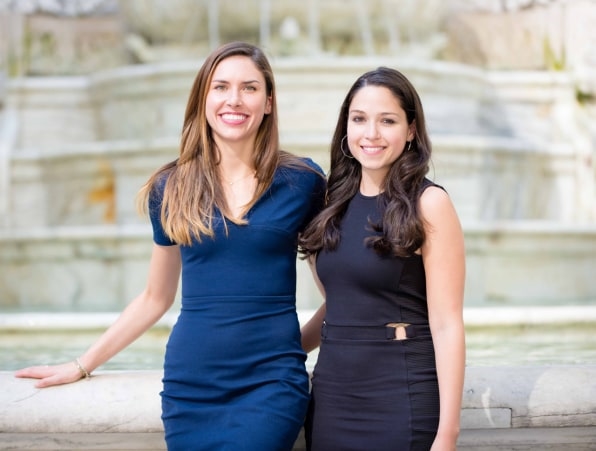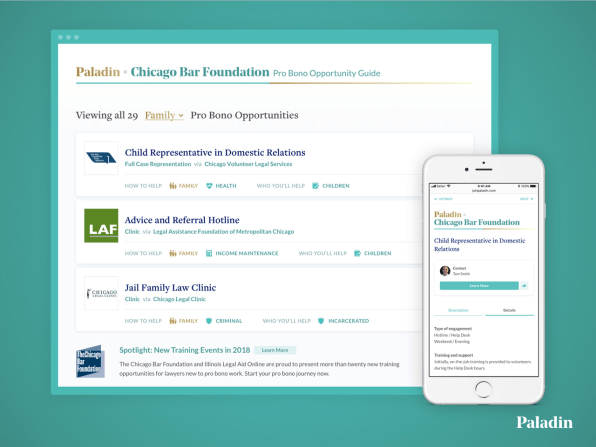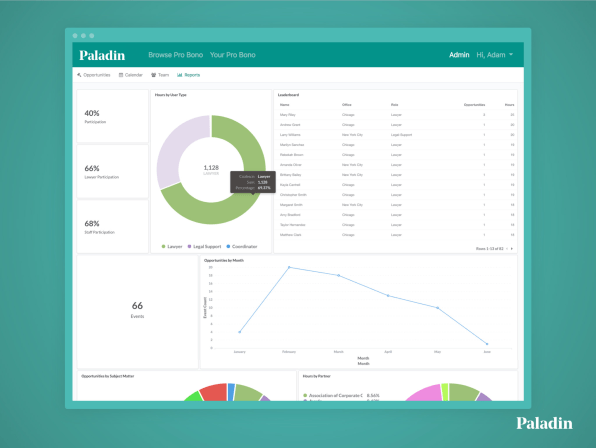A few years ago, Felicity Conrad was working at Skadden Arps, a law firm based in New York City, when she got word of a case very different than the types of corporate disputes she usually handled. A Colombian man and his family were trying to secure asylum in the United States to escape terrorism in their home country, and needed legal assistance in making their case. Conrad took on his case pro-bono and went to immigration court, where she was able to help the family secure asylum.

“After that experience, I looked to my right and looked to my left, and wondered: Why isn’t every single lawyer doing pro-bono work?” Conrad says to Fast Company. Right now, it’s an especially weighty question: As well over 5,000 families have been separated at the U.S. border due to harsh immigration policies and are now seeking aid and protection, and as growing numbers of Americans are evicted from their homes each day in an increasingly unaffordable housing market, the need for free legal assistance is higher than ever. But there’s a gap, Conrad says, between the people in need, and the lawyers who can offer assistance. Estimates show that 80% of people who need legal assistance in this country do not receive it, despite the American Bar Association recommending to its 1.3 million lawyers in the U.S. that they do 50 hours of pro-bono work each year.

[Image: Paladin]
This disconnect often comes down to logistics. In order for Conrad to get connected with the Colombian family, for instance, she had to wade through an email chain circulated by the pro bono program manager at her firm. “Most major law firms in America have pro bono programs, but the firms run these programs through really manual processes–spreadsheets, emails, phone calls,” Conrad says. And some in-house legal teams (like for startups or smaller companies) do not have pro-bono program managers at all, and as such, lawyers on those teams often do not fulfill their annual 50 hours of pro-bono work. She began to realize that inefficiencies in the way corporate lawyers connect with pro-bono opportunities were contributing to the “justice gap” that was failing many people who needed legal assistance.
That thought really solidified when, through a mutual friend, Conrad met Kristen Sonday, who had spent several years working with the U.S. Department of Justice in Mexico City, and saw firsthand how difficult it is for people–especially non-English speakers–to navigate the justice system in America. Conrad and Sonday realized that streamlining the way pro-bono opportunities are disseminated to corporate firms could help more people in need of assistance access it.
They teamed up to create Paladin, a software-as-a-service platform designed to streamline the way legal teams access pro-bono opportunities that officially launched last year, and is quickly scaling up. The platform is simple: Legal teams can sign up to create an account, where a program manager can input pro-bono opportunities into the system. All the lawyers on the team create profiles and can sign up to take a case with just a click of a button. The Paladin platform, Conrad says, essentially helps legal teams up the volume of pro-bono work they take on, and also track progress on cases. Being able to see the impact of their lawyers helping represent families seeking asylum incentivizes legal teams to keep growing to the volume of cases they send to their staff.

The in-house legal team at Verizon, which boasts 900 attorneys, is working with Paladin now to manage its pro-bono workflow, and the startup recently onboarded Lyft, whose in-house legal team of 50 attorneys previously had no form of pro-bono program. “One of the issues they’re really passionate about is a lot of the immigration work happening right now, including family separation at the border,” Conrad says. So as part of the onboarding process, the Paladin team introduced the Lyft legal team to organizations like RAICES Texas, which are providing legal assistance directly to families in need, so the Lyft lawyers can begin taking on cases.
For the time being, Paladin functions as an internal service for legal teams, enabling them to upload pro-bono opportunities for their lawyers to take. But the startup has raised over $1.1 million from investors like Mark Cuban to expand its scope. Over the next year, Paladin will begin to serve as more of a matchmaker between corporate law teams and those working with pro-bono clients. “We’re starting to build out the network component that will connect legal service organizations and law firms to really build out a global pro-bono network,” Conrad says.
By doing so, Paladin hopes to dramatically ease access to pro-bono assistance for people who need it most. Because just around 10 to 20% of legal teams currently have someone who manages pro-bono case offerings, Conrad and Sonday figure that as many as 80 to 90% of lawyers in the U.S. are just not aware of the scope of need—or more importantly, how they can be of service. “One of our hypotheses in building the tech that we’ve found to be true is that by streamlining the pro-bono process within organizations, we’re really able to increase engagement,” Conrad says.
(30)